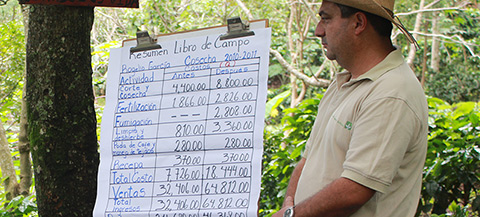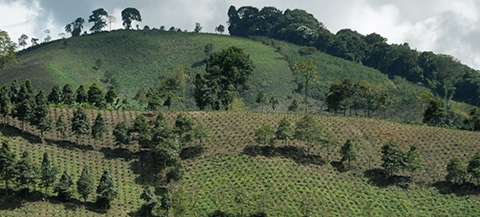At its heart, The Tim Hortons Coffee Partnership is about improving the lives of coffee farmers. By empowering them, with the skills they need to succeed, their families and the entire community benefits. It's a philosophy consistent with our long history of giving back to the communities we serve.
In 2005, we launched the Tim Hortons Coffee Partnership to improve the businesses and lives of coffee farmers in the regions where we source our coffee. To date, we have worked with over 4.000 farmers and have influenced the lives of over 20,000 people in our project communities located in four countries: Brazil, Colombia, Guatemala, and Honduras.
Our Coffee Partnership currently includes four distinct projects where we have committed for 3-5 years helping farmers learn how to succeed in today's quickly changing market conditions. By working with exporters, non-governmental organizations and most importantly, the farmers themselves, the Tim Hortons Coffee Partnership provides the skills and tools they need to survive in times of poor markets and thrive in good ones. We do this sustainably, by improving the economic, social and environmental aspects of the farmer's own business.
At its heart, the Tim Hortons Coffee Partnership is about improving the lives of coffee farmers. By empowering them, with the skills they need to succeed, their families and the entire community benefits. It's a philosophy consistent with our long history of giving back to the communities we serve.
Our Unique Approach
Tim Hortons has over 45-years of coffee buying expertise. We understand the markets, and dynamics of the coffee business, consumer trends and the challenges faced by small-scale coffee farmers. In our project regions, small-scale farmers typically own between 2-10 hectares of land. We also actively study emerging trends and developments in improving the sustainability and livelihoods of coffee farmers.
In 2005, we undertook a comprehensive analysis of mainstream coffee certification models including Fairtrade, Rainforest Alliance, UTZ Certified, 4C Association, and others. As a result of this study, the Partnership was established to address sustainability issues we felt could work in conjunction with their important work.
Tim Hortons Coffee Partnership is focused on:
A balanced approach
We take a balanced approach to the economic, social and environmental aspects of coffee farming. While we respect and admire the work of other certification models, we believe some of the models focus solely on one or two of these aspects.
Higher yields, improved quality and higher prices
We believe in a market driven approach, helping farmers improve the productivity of their farms and the quality of their beans in an environmentally sustainable way. Improved productivity allows them to grow more coffee on the same amount of land. Growing higher quality coffee enables them to command a higher price in the coffee market. Other models take a flat price approach and therefore a farmer has little incentive to improve the quality of their coffee.
Technical assistance is fundamental
Where some other models do not directly provide technical support to individual farmers, we offer technical assistance directly at the individual level. We focus on agronomic, organization, shade, soil, environmental, farm management and accounting training - all the tools farmers need to run a successful and sustainable business. Support is offered in a participatory and transparent way between all of our project farmers.
Organizational development
Where other models may only work with established co-operatives or organizations, most farmers that join our Partnership currently operate as independent farmers. Our projects encourage cooperation through organizational development, encouraging farmers to pool their resources, save money and share best practices.
Farmers making their own business decisions
Our project farmers regularly participate in self-assessments and group evaluations to determine how their businesses are performing, and how they can be improved. This bottom-up approach allows project farmers to control their own business decisions. Other models impose an internationally developed set of standards applied to farmers in a top-down manner.
It is important to note that the farmers we help are not required to sell their coffee to Tim Hortons. Rather, they may sell their beans to any entity they choose. This is not always the case with other coffee models - We believe in a collaborative approach and in educating small-scale coffee farmers. We provide education to farmers in all our projects about costs and benefits of the various certification models. After participating in our projects, some of our farmers choose to certify their coffee to maintain some of the business practices that we have put in place and to increase the opportunities to get their coffee to market.
Social well-being for farmers and their communities
It is important to us to support not only the coffee farmers themselves, but their communities as well. With this in mind, our Partnership is focused on empowering youth and enhancing education. We partner with, and support local governments, coffee associations and non-governmental organizations (NGOs) to develop and implement programs in our project communities. We also embrace the development and promotion of women as a core, and holistic component of sustainability. Since 2005 over 400 female coffee farm owners have participate in our projects.
No certification fee to farmers
Tim Hortons does not require farmers to pay certification fees to participate in our Coffee Partnership. In other models, certification costs can run as high as USD$3,000 - fees that can pose a significant barrier to small scale farmers.
Third party verification
Our Partnership has developed Key Performance Indicators ("KPI"s) to measure the impact and success of our Coffee Partnership. Performance is verified by an independent third party verifier in addition to our own review. (See Third Party Verification for more details). We currently work with Control Union Certifications for third party verification.
Interested in learning more, or comparing sustainable coffee models?
Our Three Pillars
The Tim Hortons Coffee Partnership is based on three fundamental pillars:
Economic:
Helping coffee farmers earn a better living by training them to be better farmers, and run better businesses.
Social:
Empowering youth and improving childhood education in coffee communities to provide better opportunities for the future.
Environmental:
Educating coffee farmers and helping them adopt more environmentally sound, and sustainable farming practices.
Our Partners
The Hanns R. Neumann Stiftung (HRNS) Foundation

This non-profit foundation supports environmental programs and runs grassroots projects with small holder coffee farmers all over the world. HRNS aims to establish a more level playing field by improving work and living conditions, protecting natural resources, slowing climate change and encouraging biodiversity.
HRNS implements Tim Hortons Coffee Partnership projects on our behalf. (www.hrnstiftung.org/)
The Tri-National Commission of the Trifinio Plan

This commission works to implement a Management Plan that improves sustainable management of water resources. A major focus is improving coffee cultivation to meet Commission objectives, while providing a sustainable livelihood to farmers in the region. (www.sica.int/trifinio)
Control Union Certifications (CUC)

An independent third-party verifier for the Tim Hortons Coffee Partnership. (www.certification.controlunion.com/)
Third Party Verification
In order to monitor the success of our projects, we developed a comprehensive set of key performance indicators (KPIs) aligned to the economic, social and environmental aspects of our program. Since 2009, we have worked with Control Union Certifications as our independent verifier.
Examples of our KPIs include but are not limited to:
Economic
- Existence of a farm improvement plan to increase productivity
- Number of training contacts/demonstrations
- Total coffee production including average yields and production costs
- Total coffee sold via organization
- Total income generated at farmer organizational level
Social
- Total number of farmers participating
- Compliance with established International Labor Organization (ILO) Conventions regarding child and forced labor
- Compliance with established United Nations (UN) Declarations on human rights
Environmental
- Hectares of land under environmentally sustainable management
- Percentage of water recycled and/or treated in coffee processing
- 100% of farmers not using banned pesticides
- Percentage of farmers applying soil analysis and fertilizing plans
- Number of trees donated to the project
- Average shade tree density per hectare
Performance:
Performance highlights are outlined in our Sustainability and Responsibility Report.
FAQ
Q.
Why doesn't Tim Hortons participate in other coffee farming certification programs?
A.
Certification programs are one way to help coffee farmers get a better price for their coffee, but farmers face many challenges, including improving coffee quality and yields, learning sustainable farming practices and finding quality education for their children. The Tim Hortons Coffee Partnership works directly with farmers to meet all of these challenges.
For more information visit 'Our Unique Approach'.
Q.
What is independent 3rd Party Verification?
A.
In the Tim Hortons Coffee Partnership, 3rd Party Verification involves hiring an independent third party to objectively measure the progress of coffee farmers toward meeting their goals.
For more information visit the "Third Party Verification" section.
Q.
What about pesticide use in coffee farming?
A.
Pesticide use is widespread in coffee farming and damages crops, soil and water. The Tim Hortons Coffee Partnership restricts the use of banned chemicals and pesticides on our project farms. Banned pesticides refer to those pesticides banned under the Stockholm Convention on Persistent Organic Pollutants (POPs). We have incorporated practical strategies for our farmers to comply with our requirements through our Farmer Field Book and Training required to participate in our projects.












































